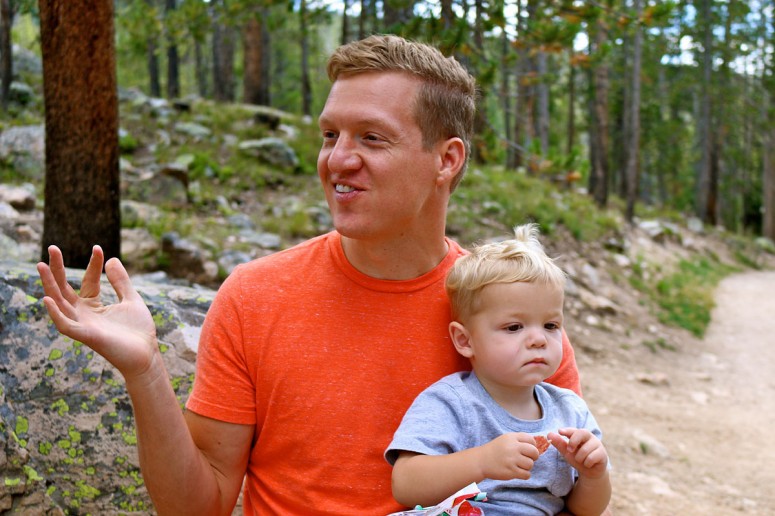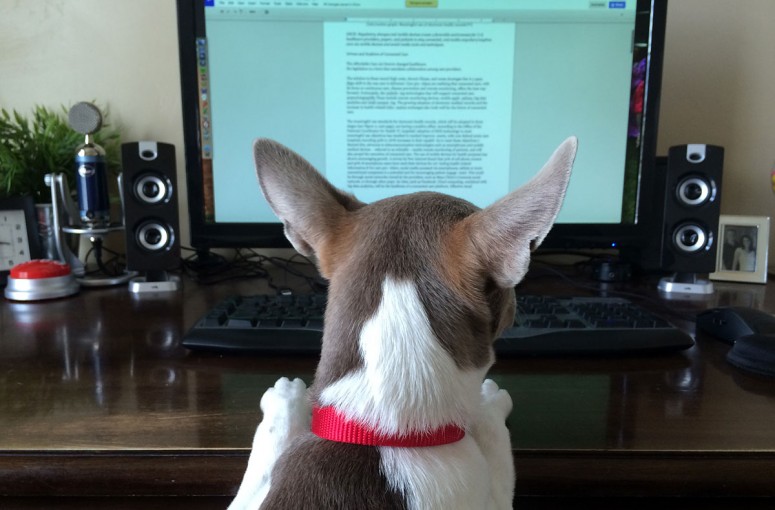Growing pains: Top 10 lies of life

Here goes nothing. If I missed anything, set me straight in the comments: Continue reading…

Here goes nothing. If I missed anything, set me straight in the comments: Continue reading…

Wikimedia Commons
PROVO, Ut. — Want to get ahead in this world? Work lots of extra hours — even nights and weekends — experts say, and it will all be worth your while.
“It’s easy to forget what’s most important in life,” says Bill Loney, a certified life coach who hasn’t quite made it in life yet. “Family, friends, and social activities that can often inspire and enrich the life of an individual… these are all distractions in getting more work done,” he adds.
Emma Royds, who hasn’t stopped looking at her smartphone every five minutes for three straight years, councils that most people actually die wishing they had spent more time — not less — working. “People never regret working too much,” she says. “My neighbor opted to do adventurous, social, and fitness-related activities with family and friends in his spare time.
“Now 80, he told me recently he really wishes he would have spent more time on TPS cover sheets, obsessively trying to turn his company into the next big thing, and reading email during every waking hour of his life. It’s kind of sad, really.” Continue reading…

Photo: Lindsey Snow
In recent years, a new ideology has emerged. It is this: work-life balance is impossible; therefore, humanity must embrace work-life blending instead.
I tried work-life blending for six years before we ever called it that. I’m here to tell you it stinks and is largely a pipe dream—nothing more than a new term coined by self-absorbed workaholics to justify their personal regrets, negligence, and imbalances in life.
Now let me tell you how I really feel. Continue reading…

Not-so deep thoughts by Blake Snow
Half of Americans say they lead “imbalanced” lives, according to a recent survey. I’m not sure if that’s better or worse than what I’ve anecdotally experienced. But it’s worse than other countries.
Of course, finding balance has always been a part of the human condition, at least since the industrial revolution, if not before—many recorded and Biblical accounts acknowledge this. Our imbalance plight accelerated in the ’80s, however, after we entered the information age.
Why does more imbalance exist in America than anywhere else? Continue reading…

Photo: Warner Bros.
Brian Hamilton is head of a million dollar software company. He believes work-life balance is a myth. “Working obsessive hours is nearly a requirement for success,” he writes for Entrepreneur. “For those who feel possessed by entrepreneurship and want to get their idea or product out to the world, you can have work-life balance, as long as the two are one in the same.”
What Hamilton is describing is the trendy practice of anything-goes, work-life blending, which treats imbalance as a pipe-dream at best, a casualty of war at worst. To that I say: Keep telling yourself that. The only thing that seems to change peoples’ minds is a death bead. After not being true to oneself, overwork is the second biggest regret of the dying.
Deep down, I think even Hamilton and others like him know this. “The ability to compartmentalize and separate work,” he concedes, “probably leads to a much more content and happy existence.” But he, like many others, seems dead-set on wholly identifying with (or at least spending the majority of his waking time on) what he contributes economically to the world. Often times popular ego-feeding is to blame. Continue reading…

Photo: Platon/New Yorker
Clay Christensen, a man I deeply respect, has the answer:
“Christensen had seen dozens of companies falter by going for immediate payoffs rather than long-term growth, and he saw people do the same thing,” writes Larissa MacFarquhar for the New Yorker. “In three hours at work, you could get something substantial accomplished, and if you failed to accomplish it you felt the pain right away. If you spent three hours at home with your family, it felt like you hadn’t done a thing, and if you skipped it nothing happened.
“So you spent more and more time at the office, on high-margin, quick-yield tasks, and you even believed that you were staying away from home for the sake of your family. Christensen had seen many people tell themselves that they could divide their lives into stages, spending the first part pushing forward their careers, and imagining that at some future point they would spend time with their families—only to find that by then their families were gone.”
In other words, you become what you prioritize. Metamorphosis from sustained work-a-holic into a well-rounded and interesting person doesn’t just happen.

Photo: Blake Snow
Americans rank near the bottom in work-life balance because we work more than anyone, that much we know. (Caveat: We don’t work more than we used to, according to decades of research by John Robinson. We just perceive busy-ness as work and fill our free time with it. More on that later.)
But we don’t have to work as much as we do. Quite the opposite, in fact. “Researchers note that productivity rates have risen, which theoretically lets many people be just as comfortable as previous generations while working less. Yet they choose not to,” reports the New York Times. Even visionaries admit as much. “The idea that everyone needs to work frantically is just not true,” says Google CEO Larry Page. “Reducing the workweek is one way to solve the problem.”
I decided to do just that recently in switching from a five to four-day workweek. Like after I quit working nights and weekends, I won’t ever go back (given the choice). In four days, I’ve gotten just as much done as I did in five, because I waste less time now. As the forward-thinking Jason Fried explains, “Constraining time encourages quality time. When you have a compressed workweek, you focus on what’s important.”
So we have evidence that all this snazzy technology lightens our load, increases our productivity, and allows us to work less. And yet we still choose to work more than we need to. Why?! I’ve researched the issue for my book and came away with the following five answers: Continue reading…
Hey, you. Yeah, you—the one reading this. The one that says ignorant things like “I’ll sleep when I’m dead,” “I’m busier than you,” or “I only require 3-4 hours of sleep.”
This research by Harvard obviously doesn’t apply to you, because you’re the exception in life. You’re superhuman.
For the rest of us, the study is a convincing reminder of mortality. Not only convincing, but alarming.
 When I was younger and dumber, I used to work 11 hour weekdays, half-day Saturdays, and was mentally distracted with work for much of the rest of time. Although I work for myself and have a ridiculously flexible of schedule, I vacationed very little at the time. I was seeking fortune and professional notoriety. I thought 60+ hour work weeks would get me there faster.
When I was younger and dumber, I used to work 11 hour weekdays, half-day Saturdays, and was mentally distracted with work for much of the rest of time. Although I work for myself and have a ridiculously flexible of schedule, I vacationed very little at the time. I was seeking fortune and professional notoriety. I thought 60+ hour work weeks would get me there faster.
It did’t. It made me counter-productive, short-sighted, and less money on a per hour basis. In fact, Henry Ford discovered this 100 years ago, according to Inc.
As I’ve said before, the idea of overworking yourself while you’re young so you can relax later in life is bunk. Which is why I take issue with the below remark by Amber Mac, writing for Fast Company on how to validate your unwillingness to take time off:
I’m not saying that [notable businessmen who leave work after hours and on weekends] don’t work hard. Quite the opposite. Clearly they’ve hustled for years, propelling themselves into fantastic careers that I would argue finally give them the opportunity to design their lives with the freedom they’ve shared as of late.
Wrong. Some success stories just have different priorities than others. If you’re like most people and are driven by a “getting ahead” mentality, then sure: work your tail off while your body is in tip top shape while neglecting family, friends, and hobbies in the process. Then regret it later as you sit in a empty home with lots of stuff, a deteriorating body, and wishing instead you had followed your passions.
Or you can do it the other way: Work hard during the work day. Want less (aka be content with the simple things in life). Take nights and weekends off to foster relationships, listen to good music, eat good food, read great literature, watch film and volunteer. Then pepper that several times a year with wonderful vacations to see the world.
As for me and my house, we choose the latter.
You know mulitasking is nothing more than a feel-good concept, right? It’s a word people use to make them feel more productive. And “work-life balance” is anything but according to productivity ninja Tim Ferriss:
“For most of the planet, I would assert that the ideal dream job is the one that takes the least time. Be productive instead of busy, and recognize that life is full of special relationships and activities that need to be protected from one another. Focus on artful separation instead of integration, and you might just—as I did—feel as though an enormous burden has been lifted. Expect a lot out of life, but don’t expect too much from your job. It’s just one tool. Make it a specific one.”
Wise counsel.
See also: Book review: The 4-Hour Work Week
When I first read this headline, I thought, “Oh boy. Here we go again.” Usually when someone makes the one-sided case for becoming an entrepreneur, I just roll my eyes. Nearly all of them try and convince you of the following: “Everyone should be an entrepreneur,” “realize your dreams and be happier while making it on your own, ” and “let your money work for you.” Ugh. That train of thought is so tired and illogical. Fact: risk averse individuals will be happier and more successful working for someone else. There’s no shame in that. On the other hand, if you have an unusual fetish for making something better, entrepreneurship or independent contracting may be a good fit.
But Why You Need To Be An Entrepreneur — despite its clever link baiting headline — is a misnomer as the article’s recommendation is more balanced than the headline suggests. “There is nothing wrong with working a 9 to 5 because one of the main goals in life is to be happy. It’s just that different things make different people happy.” Well said. The column’s points for entrepreneurship are also correct for the most part, though I dispute numbers 1 and 4 a bit.